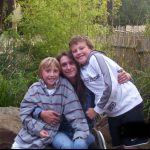Blog
Always looking ahead
 Despite sustaining an SCI in her teenage years, Dot Brogden pushed herself to move forward and now enjoys life as a working mother to two boys. Read on to find out how her outlook on life has helped her to challenge herself and achieve her goals.
Despite sustaining an SCI in her teenage years, Dot Brogden pushed herself to move forward and now enjoys life as a working mother to two boys. Read on to find out how her outlook on life has helped her to challenge herself and achieve her goals.
I’ve been paralysed for almost 30 years after sustaining an SCI as a teenager. The future seemed bleak and I never dreamt I’d become an independent working mother, despite having a major disability.
After months of rehabilitation, I returned home and to school. It was hard to return to familiar surroundings being such a different person. With the school’s support I passed several GCSEs, however, the thought of higher education was overwhelming as I wasn’t sure I’d cope.
Due to difficult circumstances at home, I left at 18 to live independently. It was a very steep learning curve but the rehabilitation proved invaluable, having relearnt how to do everyday tasks from a wheelchair. Good friends enabled an active social life, frequenting pubs and nightclubs together; they ensured any access issues were overcome, even carrying me when necessary!
On a night out I found love and at 22 discovered I was pregnant. I was overjoyed and terrified. No one was sure what effect my disability would have, but the only issues were with bladder management and repeated infections. As my bump grew it affected my balance, which made transferring increasingly difficult. I went into spontaneous labour at 40 weeks and gave birth naturally to a healthy son, James – albeit with a room full of doctors and a surgeon in scrubs, just in case. Two years later history repeated itself and Ryan was born, but this time with only a midwife present. Again, the pregnancy went smoothly, although this time urine infections became kidney infections. However, that was the only complication I experienced.
Motherhood from a wheelchair was incredibly demanding and challenging, compounded by the fact my husband frequently worked away. My friends helped when I needed it but I was determined to do it myself, meaning I was often aching and exhausted. Nevertheless, the sense of achievement counteracted the impact it had. There were many obstacles and I had to do things differently and find creative solutions, but the children adapted as they knew no different. At times it was heartbreaking as I couldn’t do things I wanted to with them.
Most parents don’t think twice about walking holding their child’s hand. It was something I could never do, but I learnt to focus on the love and laughter as no disability can constrain that. I learnt to drive so we could have days out and go on adventures; it was the best thing I ever did as the freedom it gave me was priceless.
Once the boys started school I enrolled on an access course, passing five GCSEs and four A levels, so I applied for a degree in biology. Juggling motherhood with studying was immensely onerous. I spent three years completely shattered, pushing my body and mind to its limits. Conversely determined to succeed so I could prove to myself and the world that the only limits are the ones you place on yourself, I graduated with a first-class honours degree.
As my studies ended, so did my marriage. The skills I’d learnt over the years meant I coped with the new challenges I now had to face, and I devoted myself to raising my sons. Once life had settled into a routine I started job hunting. Despite having a degree I struggled to find work; interviews were sporadic and never successful. A friend recommended Cadent (formerly National Grid), so I submitted my CV and instantly secured an interview. Initially I was offered a role as a gas emergency call handler, before transferring to my current role as a data analyst, which utilises the skills I gained at university. I genuinely enjoy my work and can’t praise Cadent enough for its support and attitude towards disability.
I have to balance work and rest, as I’ve had many ups and downs over the years with my health and learnt the hard way that self-care is very important. Struggles with pressure sores and infections meant I have been seriously ill at times, but my SCI Centre monitors my health; the advice and support it offers is irreplaceable. In order to be able to live a full life, I have to listen to my body and do what it needs, which can be incredibly frustrating – but so is bedrest!
The mental fight can be as difficult as the physical one. Perspective and attitude make a massive difference to how you feel and face the future. Looking back and dwelling on what can never be will only drag you down. “Change what you can, accept what you can’t” are words I’ve learnt to live by. It isn’t easy but it is worth it. Life may not turn out the way you expected or planned, but it will be what you make of it. I don’t know what my future holds. I’ll see where it takes me, but for now I’m on a roll.
This account first appeared as an article in the June 2018 issue of FORWARD magazine. Find out more about FORWARD.